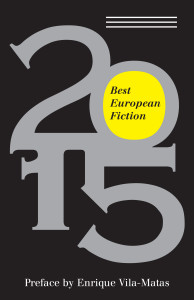Rein Raud, ‘The Demise of Engineer G.’
Raud, ‘The Demise of Engineer G.’
Translated from the Estonian by Matthew Hyde
The narrator tells of his old friend G. – engineer, philatelist and gourmet, who threw the most fabulous dinner parties in an age when ingredients were scarce for most people. He also had shelves of literature: books he never really read, but which often had curious printing errors Somewhere in all this is the key to the riddle of how G. died.
Rein Raud’s story is delightfully oblique, shorn of the specific details that might enable us to work out exactly what’s going on: it’s mostly just G., his friends and his food. And what food it is:
In his masterfully planned menus one delicacy followed another, such that the most subtle nuances of flavor of every dish created a marked contrast with those of the succeeding course…at exactly the right speed for each subsequent taste to cut into the previous one at the very last moment, when the surface of the tongue, slightly straining, still wanted to keep the fading aftertaste in the mouth, so that the first new aromas had the best possible impact.
Though Matthew Hyde’s translation is capable of bringing to life sensations like that, there’s a certain fustiness about it which gives the sense of a tale being dredged up from the past, complete with the distance that implies. We can hazard a guess as to why G. met his fate; but all we really know is contained in the tale’s wry closing lines.
Zdravka Evtimova, ‘Seldom’
Translated from the Bulgarian by the author
A translator walks up the drab grey street, thinking about all the men who’ve forgotten her, and the banal novella that she’s translating. She comes upon a familiar-seeming car, whose driver turns out to be the author of that very novella. He offers the translator a lift to her office; but, as the car only moves when its passenger is happy, it could be quite a long journey…
I enjoyed this story. Zdravka Evtimova’s prose is unassuming and understated, which only adds to the sense of ordinariness:
I thought one could hardly dub “town” the dozen ramshackle houses and the narrow, asphalt road that touched the apathetic buildings and climbed to the black sky in the distance.
Of course, what’s going on – be it hallucination or something more mysterious – is far from ordinary; but the lightness of Evtimova’s touch makes her tale entirely persuasive. When the abrupt final lines come along, it’s like waking from a dream – for reader and protagonist alike.
Read my other posts on Best European Fiction 2015 here.
0 Comments
1 Pingback